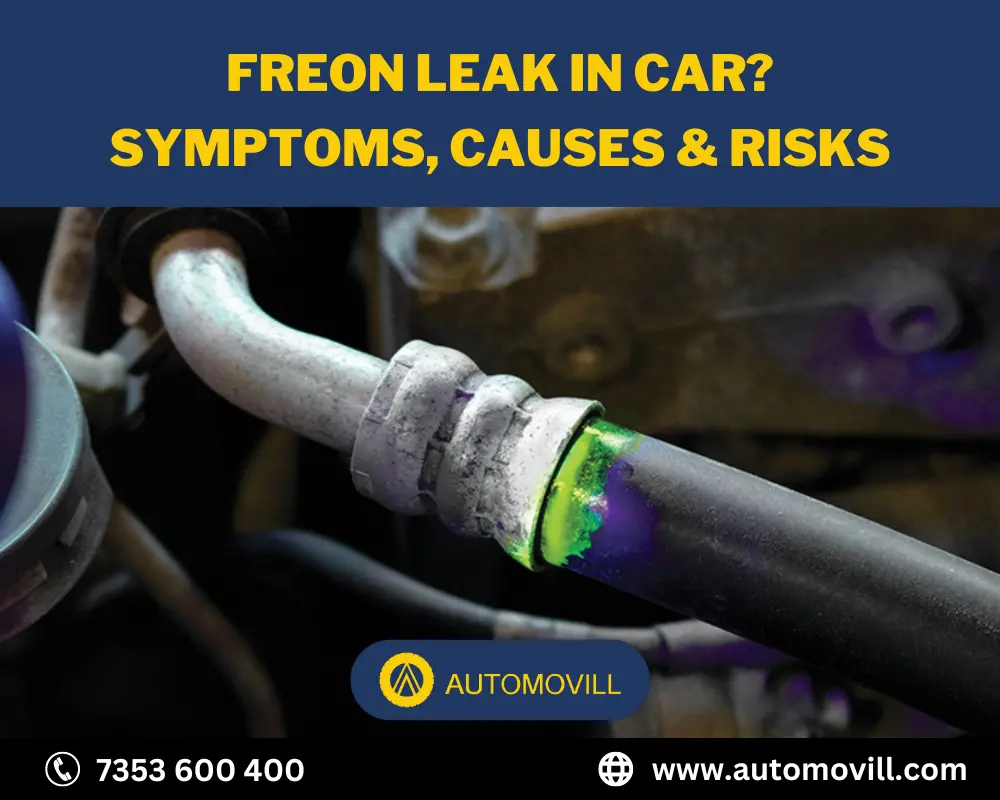
Have you ever experienced warm air blowing from your car’s air conditioner on a hot day, or noticed a strange noise and smell coming from the vents? These could be signs of a freon leak in your car’s air conditioning system.
Freon is a non-combustible gas that is used as a refrigerant in your car’s AC system which is responsible for cooling, and a leak can cause warm air, damage to other AC components, and even health risks.
In this article, we’ll know the symptoms of a freon leak in a car, as well as the causes, risks, and solutions
Symptoms of Freon Leak in Car
- Warm air blowing from the AC: If the air blowing from your car’s AC system is warm, it could be a sign of a freon leak. This happens because freon is responsible for cooling the air before it’s blown into the car’s cabin. If there’s not enough freon in the system, the air won’t be cooled properly.
- Low Airflow: If there is low airflow from the AC vents, then it happens because of the low quantity of freon and causes the AC compressor to work harder than usual, leading to reduced airflow and low cooling.
- Unusual Noises: If you hear unusual noises coming from the AC system, such as a bubbling sound, it could be a sign of a freon leakage. This happens because the freon escapes from the system and makes these noises.
- Unpleasant Smell: If you smell a bad or unpleasant smell coming from the AC vents, it could be a sign of a freon leak. This happens because the freon leak can cause moisture to build up in the AC system, leading to mold and mildew growth that causes these odors.
- Moisture or Oil Residue Around The AC Components: If you notice the presence of moisture or oil spots around the AC system components, then there is a high probability of freon leakage.
- Ice Buildup on the Evaporator: Finally, if you notice ice buildup on the evaporator or refrigerant lines, it could be a sign of a freon leak. This happens because the low levels of freon cause the evaporator to freeze, leading to ice buildup.
Causes of Freon Leak in Car
There are several reasons why a freon leak might occur in a car’s AC system, including:
- Age and wear and tear on AC system components: Over time, the components of the AC system can become worn and damaged, leading to freon leaks.
- Damage or corrosion to AC components: Damage or corrosion to the AC system components, such as the AC compressor, refrigerant lines, stuck clutch, etc can cause freon leaks.
- Improper installation: If the AC system is not installed or maintained properly, it can cause freon leaks.
- Environmental factors: Environmental factors, such as extreme temperatures or humidity, can also cause freon leaks in the AC system.
Risks of Freon Leak in a Car
A freon leak in a car’s AC system can lead to several risks and consequences, including:
- Reduced AC performance and increased fuel consumption: A freon leak can cause the AC system to work harder than usual, leading to reduced performance and increased fuel consumption.
- Damage to other AC system components: A freon leak can cause damage to the AC system components, such as the AC compressor, Condenser, refrigerant lines, etc, which can be costly to repair or replace.
- Environmental Impact: Freon is a chlorofluorocarbon (CFC) gas that can have a negative impact on the environment, including contributing to ozone depletion.
- Health Risks: Freon can also pose health risks to humans if it is inhaled, including dizziness, headaches, and nausea.
How To Prevent Freon Leak in Car?
If you suspect that your car’s AC system has a freon leak, it’s important to have it diagnosed and repaired by a qualified mechanic. Depending on the severity of the leak, the mechanic may recommend one of the following solutions:
- Freon recharge: If the freon leak is minor, the mechanic may simply recharge the AC system with more freon.
- Repair or replace damaged components: If the freon leak is caused by damaged components, the mechanic may recommend repairing or replacing those components.
- Complete AC system replacement: In some cases, if the AC system is old or severely damaged, the mechanic may recommend a complete AC system replacement.
In conclusion, a freon leakage in a car’s AC system can lead to low cooling performance, damage to components, and health & environmental risks. If you notice any of the symptoms of a freon leak, it’s advised to have it diagnosed and repaired by a skilled mechanic to prevent further damage and ensure your safety and comfort while driving.
